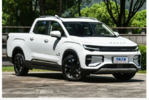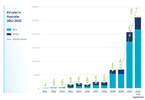- Joined
- 3 May 2019
- Posts
- 6,398
- Reactions
- 10,158

Wall Street closes with sharp gains as final quarter begins
Wall Street's three major indexes rallied to close over 2% as U.S. Treasury yields tumbled.

Not his only complaint.
Delivery dates kept changing right up to when it was actually delivered and customer service was crap.
The customer service is the main thing he's not happy about.
No one likes constantly shifting goal posts except the carny side show owner.
Yarp, but it's the way they go about it I guess.The world of ordering and having a new car delivered in several weeks are gone.
Tech billionaires Mike Cannon-Brookes and Cameron Adams rev up second-hand EV start-up
Atlassian co-founder and tech billionaire Mike Cannon-Brookes’ philanthropic green energy fund Boundless has made its first investment, joining Canva co-founder and fellow rich lister Cameron Adams in pouring $10m into The Good Car Company, a second-hand car marketplace for electric vehicles.
The Good Car Company, which is based in Tasmania and is Australia’s largest importer of second-hand EVs, is tackling what its co-founder Anthony Brose van Groenou describes as the two biggest barriers to local electric vehicle adoption – supply and affordability.
“Australia is comparatively underserved by availability and affordability of electric vehicles,” Mr van Groenou said.
“We delivered Australia’s first community EV bulk buy in 2019 and every year we witness more and more people wanting to transition to EVs and the opportunities they unlock.
“And it’s amazing to have two of the biggest and most successful tech companies in Australia backing us, I’m pinching myself.”
The investment will boost the number of affordable second-hand EVs The Good Car Company imports into Australia by tenfold per year, from about 200 to 2000. The start-up is importing pre-owned and new EVs from the UK and Japan to accelerate Australia’s EV uptake, a plan Mr van Groenou said would reduce the nation’s carbon emissions by thousands of tonnes.
The cars, which include the Nissan Leaf, Nissan eNV200 electric van and Peugeot e-expert van, will come with consumer protections including battery warranty and roadside assist, and will help expand the number of EVs available in Australia from a handful of models to eventually hundreds.
“We’re doing this as a means to an end,” Mr van Groenou said. “It’s kind of like a trojan horse, the electric vehicles, which will open up so much more than just that. It’s an inevitability that we’re going to have electrified transport, which is batteries on wheels, and there’s a whole raft of other things that tie into decarbonising our economy that we’ll then be able to do.”
He said Australia’s lack of a fuel efficiency standard was hurting EV adoption. In New Zealand, fuel efficiency standards saw the country’s electric vehicle adoption rise from 3 per cent to 10 per cent in just over a year.
The Good Car Company will sell the cars starting at $20,000 but will eventually offer them via a subscription platform, to help ease cost of living pressures for consumers. Vehicles will also be available through a series of community-based “bulk buy” campaigns around the country.
Boundless organised August’s National EV Summit in Canberra, and was formed out of a $1.5bn pledge by Mike Cannon-Brookes and his wife Annie towards a goal of cutting Australia’s carbon emissions and helping turn the nation in to a “renewable energy superpower”.
“At Boundless, our investments, initiatives, and partnerships are focused on ensuring Australia becomes a renewable energy superpower by 2030. With transport accounting for 18 per cent of Australia’s emissions, we knew our first priority had to be bridging the growing gap between demand for EVs among Australians and the supply available within an attainable price point,” said CEO Eytan Lenko, a former software engineer.
“The Good Car Company is a perfect fit, and we’ve been impressed by their continued advocacy towards investment in the EV industry as a whole. Boundless funding will help The Good Car Company increase their supply of affordable EVs by a factor of 10 and put them in a great position to catalyse further capital.”
Canva co-founder Cameron Adams and his wife Lisa Miller have also committed funds towards the company.
“It was incredibly exciting to meet a trio of entrepreneurs tackling climate change and electrification in our own backyard, and we have been enthusiastic supporters ever since,” Mr Adams said.
“The Good Car Company’s commitment towards action and changing the current state of play one car at a time is exactly what Australia needs right now.”
DAVID SWANTECHNOLOGY EDITOR

 www.goodcar.co
www.goodcar.co


Check out this absolutely brilliant electric city car. See it to the end. Well worth the time IMV
Check out this absolutely brilliant electric city car. See it to the end. Well worth the time IMV
I wonder if it's passed crash tests.
From what i understand it is a microcar, has limited speed and so is outside the car specs regulation.Interesting question. From the video the steel bar on the sides of the car are solid and an integral part of the structure.
I certainly don't think there is any crumple zone though. From the walkthrough in teh factory it is a (relatively) robust construction for a micro car. The reviewer compared it favourably to the Citroen iteration which he said was far more flimsy (but half the price)
However it seems to have passed regulations for sale in Europe becasue it is a production car.
From what i understand it is a microcar, has limited speed and so is outside the car specs regulation.
A bit like the Ligier vehicles
https://www.ligier.fr/en/..no driving licences required in France..classified as moped.
Not legal in Australia as far as i know a great scooter for cold and wet weather city driving
Yeah, but some people ride motorbikes and mopeds too. I guess not everyone feels they need to sit in a tank.The EV itself may have limited speed, but other vehicles of greater mass may crash into it and then the Microlino occupants will be mashed.
who cares about common sense; being right does not mean the tests will be changed, as the tests check impact against a wall at different approach angles.The EV itself may have limited speed, but other vehicles of greater mass may crash into it and then the Microlino occupants will be mashed.
great news but that is ABC so as truthful as a G Bush.Electric utes on the way apparently.

Electric utes are finally here. They're about to dominate new car sales, report predicts
Australians have been told that electric utes will never work – and even that they don’t exist. Now, with the first models about to arrive in the country, a report predicts they're going to boom in popularity among fleet managers and tradies.www.abc.net.au
Well the fact is that most of t he vehicles on the roads these days seem to be SUVs who would have trouble seeing a micro car.Yeah, but some people ride motorbikes and mopeds too. I guess not everyone feels they need to sit in a tank.

It's a no brainer for Tesla IMO, they are the most popular EV, so the more people who get over the range anxiety the better for Tesla, as it will mean more people will buy EV's.@sptrawler
You might get your wish of Tesla opening up its charging network if this pilot program goes well.

Elon Musk Reveals Tesla’s Supercharger Profit As The EV Maker Prepares To Open The Network
Tesla is currently conducting a pilot program to open up the supercharger network to none-Tesla vehicles. And this has raised the question, how much profit can the EV maker make from this move. Today, Elon Musk revealed the surprisingly small profit Tesla plans to make.www.torquenews.com
It's a no brainer for Tesla IMO, they are the most popular EV, so the more people who get over the range anxiety the better for Tesla, as it will mean more people will buy EV's.
Win/ win for Tesla, they charge for network usage and more people buy EV'S, so more sales for Tesla.


Hello and welcome to Aussie Stock Forums!
To gain full access you must register. Registration is free and takes only a few seconds to complete.
Already a member? Log in here.